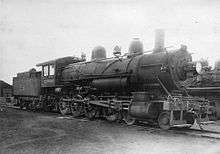Rhode Island Locomotive Works
Rhode Island Locomotive Works was a steam locomotive manufacturing company of the 19th century located in Providence, Rhode Island. The factory produced more than 3,400 locomotives between 1867 and 1906, when the plants locomotive production was shut down. The locomotive works employed about 1,400 men, and had an annual production capacity of 250 locomotives.
Coordinates: 41°49′47″N 71°25′48″W / 41.829636°N 71.429909°W
Origins

The Rhode Island Locomotive Works was established in 1865 by Earl Philip Mason, Sr. The company was later run by his three sons: Charles Felix Mason was president, Arthur Livingstone Mason was vice-president and Earl Philip Mason, Jr. was secretary and treasurer. Joseph Lythgoe was the superintendent of the locomotive works.
The company was located on Hemlock Street in Providence and between 1866 and 1899, produced some 3,400 steam locomotives during that period.[1]
Earl Philip Mason
Earl Philip Mason, Sr. was born in Providence, Rhode Island on August 5, 1848, and died at San Antonio, Texas, on March 17, 1901. He was the son of Earl Philip and Lucy Ann (Larcher) Mason. He received his early education at Mowry & Goff's School and at the Highland Military Academy in Worcester, Massachusetts. He entered Brown University in 1868 and took a special two-year course but did not graduate. He then went to Germany to study at Heidelberg University. After joining the Rhode Island Locomotive Works in 1872, he remained with the company until 1895, eventually becoming vice-president. He married on April 18, 1872, at New York City, to Mary Elizabeth Raymond,[2][3] (born September 10, 1849, in New York City and died on June 13, 1897, in Morristown, New Jersey). She was the daughter of Henry Jarvis Raymond, the founder of The New York Times, and Juliette Weaver.
Merger
In 1901, the Rhode Island Locomotive Works merged with seven other locomotive manufacturers to form the American Locomotive Company (ALCO), headquartered in Schenectady, New York. At this point the Rhode Island works had already begun to diversify, shifting production towards a line of automobiles and trucks at the Providence plant from 1906 until 1913.
Present day
The old Rhode Island Locomotive Works plant, along with the adjoining Nicholson File and United States Rubber Company buildings, is currently the center of a $333 million commercial and residential redevelopment project that went bankrupt in 2010.[4][5]
Preserved Rhode Island locomotives
The following locomotives (in serial number order) built by Rhode Island before the ALCO merger have been preserved.[6] All locations are in the United States unless otherwise noted.
| Serial no. |
Type (Whyte notation) |
Build date | Operational owner(s) | Disposition |
|---|---|---|---|---|
| 1595 | 2-8-0 | March 1886 | Colorado and Southern Railway #60 | Anderson Park, Idaho Springs, Colorado |
| 1877 | 0-6-0 | October 1887 | Minneapolis, Sault Ste. Marie and Atlantic Railway #38, Minneapolis, St. Paul and Sault Ste. Marie Railway #321, rebuilt to 0-6-0T and renumbered #X-90, (since rebuilt back to 0-6-0) |
Manitowoc, Wisconsin |
| 2943 | 0-4-4T | July 1893 | Lake Street Elevated Railroad #9 | Museum of Transportation, Kirkwood, Missouri |
| 3030 | 0-6-0T | December 1894 | Mathieson Alkali Works #2 | Saltville Museum, Saltville, Virginia |
| 3147 | 2-6-0 | November 1899 | Wabash Railroad #573 | Museum of Transportation, Kirkwood, Missouri |
References
| Wikimedia Commons has media related to Rhode Island Locomotive Works locomotives. |
- ↑ Blog of the Rhode Island Photographic Society, Alco? I don't think so ..., February 4, 2007
- ↑ Raymond, Samuel (1886). Genealogies of the Raymond families of New England, 1630-1 to 1886. J.J. Little & Co.
- ↑ "Obituary 1 -- No Title". The New York Times. June 15, 1897.
- ↑ Crowley, Cthleen (2006-03-09). "Smiles, optimism surround project in mill district". Providence Journal (reprinted by Art In Ruins). Retrieved 2007-09-01.
- ↑ Oritz, David (2007-08-27). "ALCO plan proceeds to Phase II". Providence Business News. Retrieved 2007-09-01.
- ↑ "Steam Locomotive Information". Sunshine Software. Retrieved 2005-10-04.